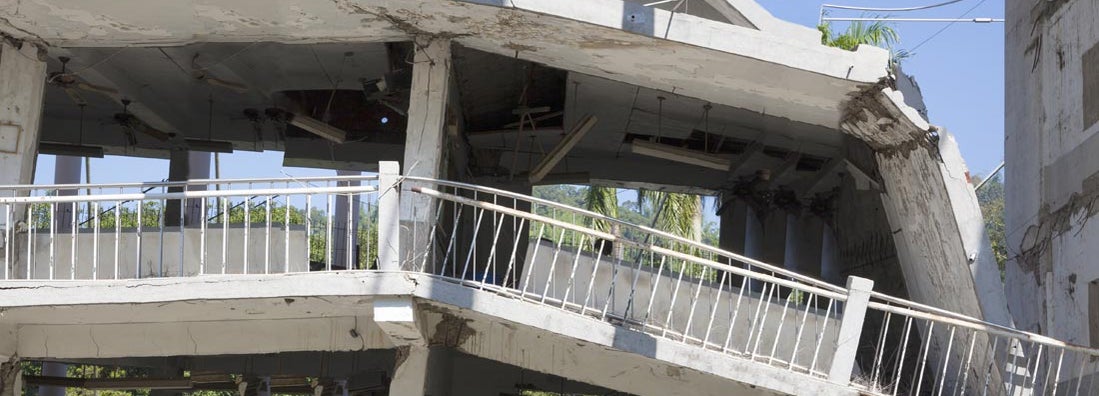Connecticut Earthquake Insurance
Find the right insurance to keep you safe in an earthquake.

Whether you live on the East Coast or West Coast, earthquakes can happen. Earthquakes cause billions of dollars in damage each year. There have been earthquakes in every state, including Connecticut, as recently as December 2013. Unless you have earthquake insurance prior to any damage, you will most likely pay for repairs out of pocket if an earthquake strikes. As you're searching through quotes, this guide can help you understand how to evaluate the insurance you're considering and get the product that best meets your needs.
An independent agent can help you compare quotes and find the perfect insurance at the perfect price to keep you safe.
Earthquakes Do Happen in Connecticut
- Earthquakes cause more than $5 billion in damage every year in the United States.
- Two earthquakes struck Connecticut in Dec. 2013, making a "booming" sound.
- Moodus, CT, along with the surrounding areas, has the most earthquakes in the state.
- On May 16, 1791, Connecticut experienced an intensity VII earthquake near Moodus.
Since Connecticut lies on the East Coast, even earthquakes that occur in the Atlantic Ocean may cause damage and tsunamis to hit Connecticut. A recent study conducted by the National Oceanic and Atmospheric Administration shows that Connecticut, New York and even Massachusetts are at risk for tsunamis due to a quake originating from a deep trench off Puerto Rico. NOAA estimates that a quake in this trench could set off tsunami waves that could last upwards of five hours, eventually reaching the coast.
Is Earthquake Insurance Legally Required?
While earthquake insurance isn't a legal requirement, your lender may require it. If earthquakes are common in your area, insurance agencies may ask that you carry a certain amount of coverage in order to secure a loan. It's important to talk to your lender about insurance requirements before purchasing a home.
Earthquake insurance is also a smart investment and ensures that you are prepared in case of an earthquake. Being able to have your home and contents repaired or replaced is the best protection you can have, in addition to an earthquake safety plan in place for your family.
What Does Earthquake Insurance Cover?
When you are looking for earthquake insurance quotes, you will get recommendations on coverage amounts from your insurance agent. Typically, your coverage should cover the full value of your home. There will also be additional coverage options for your possessions. Your typical earthquake insurance policy will look similar to the following:
- Dwelling: Dwelling coverage will cover your entire home, including any buildings attached to the main structure. This will cover foundation damage as well.
- Detached structures: If you have detached garages, storage sheds, or other buildings not attached to the home, this coverage will extend to cover those buildings.
- Contents: Replacing cupboards, furniture and TVs can get expensive. Contents coverage will enable to you to replace these items.
Additionally, earthquake insurance can also cover mudslides, tremors and sinkholes - but check your policy to see the details of your coverage.
When it comes to reimbursement on these policies, there are typically two forms of reimbursement:
- Actual cash value (ACV): Actual cash value will replace the item, taking depreciation into account.
- Replacement cost value (RCV): Replacement cost value will replace the item at its current value, without deducting for depreciation.
You should consider which coverage type is more appropriate for your situation before purchasing an earthquake policy in CT.
Insurance policies typically do not cover vehicles, boats and items such as RVs when it comes to earthquakes. Some comprehensive coverage policies will cover earthquakes, so it's important to review your policies to be sure you have earthquake coverage.
What Types of Homes Are Most at Risk?
While every home is at risk for an earthquake, there are certain homes that are especially susceptible to earthquake damage:
- Raised homes
- Wood-frame homes
- Homes built before the 1980s
- Mobile homes
- Reinforced masonry homes
- Homes with prior earthquake damage
These homes are prone to more severe earthquake damage, as they typically cannot withstand or flex with the vibration caused by an earthquake.
What Does Earthquake Insurance Cost in Connecticut?
There is no strict average for earthquake insurance cost, and the quotes for an earthquake insurance policy in Connecticut may depend on the following factors:
- Age of home
- Structure materials
- Location
- Deductible preferred
- Coverage amount preferred
There are also things you can do to earthquake-proof your home including anchoring all items to walls, bracing water heaters to walls and installing shut-off switches for gas lines.
Where to Get Coverage
Whether you have questions regarding earthquake insurance or you're looking to purchase a policy, it's important to get quotes, to compare rates and to be sure that you have the right coverage for your unique situation.
A TrustedChoice.com agent is always available to answer questions and help you with all your insurance needs. Talk with an independent agent today for more information.
